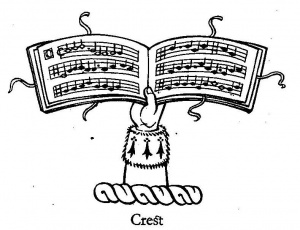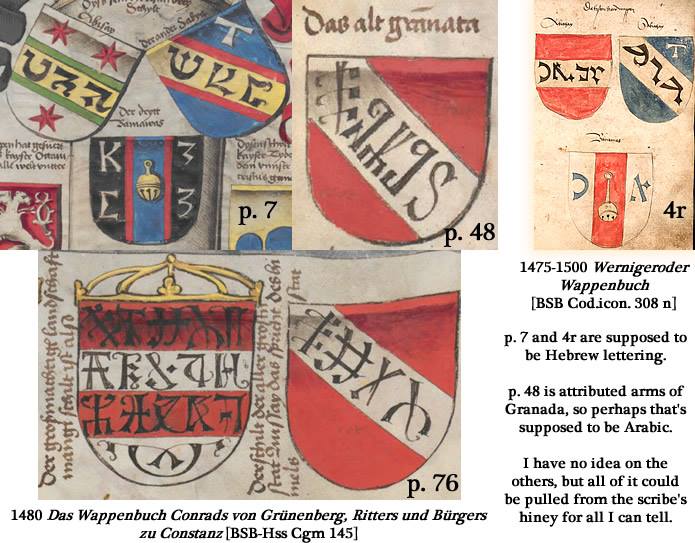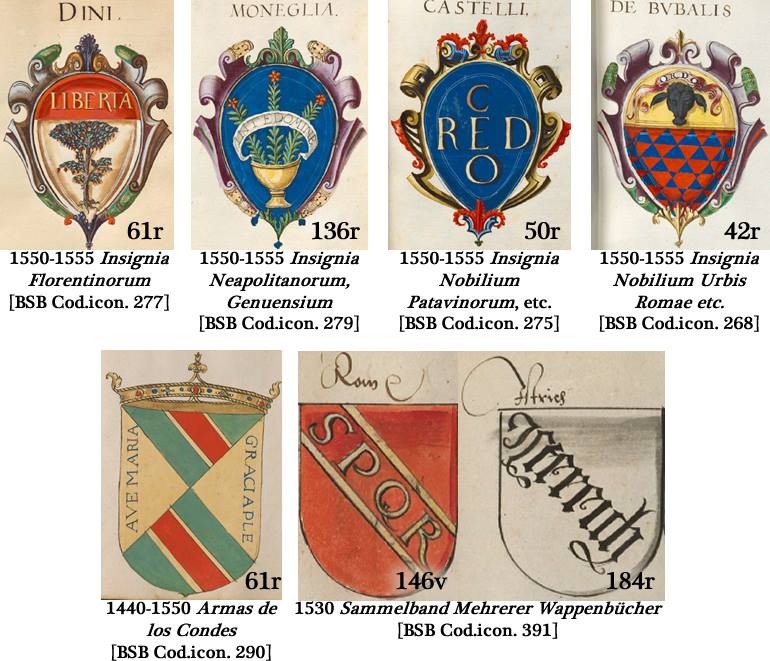Symbols, Letters, Runes, etc
WARNING: Do not cite this page as a reference. This page is on this wikispace only to make the content "searchable" and easier to find. If you find the information you seek here, go to the original sources as linked below to verify the information and use them for your documentation.
Illustrations:[edit | edit source]
Period sources:[edit | edit source]
Period Crest with Astrological Signs:[edit | edit source]
The crest of Bull, watchmaker to Elizabeth I was: "On a wreath argent and gules, a cloud proper, thereon a celestial sphere azure, with the circles Or; on the zodiac the signs of Aries, Taurus, Gemini, and Cancer." (Parker, p. 547) https://www.heraldsnet.org/saitou/parker/index.htm
Illuminated initials in manuscripts at the British Library[edit | edit source]
- (collected by Aryanhwy merch Catmael) - http://www.ellipsis.cx/~liana/candi/puzzleinitials.html
Siebmacher has:[edit | edit source]
(http://www.ellipsis.cx/~liana/heraldry/siebmacher/symbol.html):
- Gules, a capital G argent, Glogaw (222).
- Gules, on a fess argent, a capital A sable, von Althann (22).
- Or, on an eagle sable an escutcheon gules charged with a capital T argent, Tull (220).
- Per fess sable and gules, in base a capital W argent, Wildperg (226).
- Sable, a capital letter Z argent, die Komantzky (75).
Music Book:[edit | edit source]

|
| Prick-song book, 1582 Parish Clerks |
Non-Roman Alphabet:[edit | edit source]

Roman Alphabet:[edit | edit source]

Modern:[edit | edit source]
Pictorial Dictionary, 3rd edition:[edit | edit source]
- [1]
- Cypher charges
- Letters, see also musical note, nefr, rogacina.
Vector Graphics:[edit | edit source]
- Book of Traceable Heraldic Art
- Viking Answer Lady - http://www.vikinganswerlady.com/Stars/Heraldry_SVG_Images/index.htm
Annotated Pennsic Traceable Art Project[edit | edit source]
Sources:[edit | edit source]
- Academy of St. Gabriel "Medieval Heraldry Archive" - http://www.s-gabriel.org/heraldry/
- Archive of St. Gabriel reports - http://www.panix.com/~gabriel/public-bin/archive.cgi
- Laurel Armory Articles - http://heraldry.sca.org/laurel/armory_articles.html
- New Heraldic Primer (Heraldry for Non-Heralds) - http://heraldry.sca.org/armory/newprimer/
- Pictorial Dictionary of Heraldry (PicDic), 3rd Edition - http://mistholme.com/pictorial-dictionary-of-heraldry
- Period Armorials
- Parker's Heraldry - https://www.heraldsnet.org/saitou/parker/index.htm
- Riestap's Armorial Général - http://www.euraldic.com/lasu/bl/bl_a_aa.html
Search terms for period calligraphy hands in rough chronological order: Roman, uncial, half-uncial, Carolingian miniscule, gothic, blackletter, batarde. "Versals" are the really fancy letters at the beginning of a manuscript page.
Precedents:[edit | edit source]
Precedents of the SCA College of Arms - http://heraldry.sca.org/laurel/precedents.html
Morsulus Heralds Website - http://www.morsulus.org/ (to search the LoARs and Precedents)
Use the above links to be sure any precedents listed below haven't been superseded by newer precedents.
Definition:[edit | edit source]
(includes defaults, proper tinctures, blazoning)
February 2003 - chi-ro as single abstract symbol:[edit | edit source]
A chi-rho is functionally a single abstract symbol. Although most two-letter combinations would not be so considered, the chi-rho has, through long use in religious symbolism, achieved an independent identity as a single abstract symbol. February 2003 LoAR
Registerability:[edit | edit source]
(Restricted, Reserved, SFPP, OOP)
July 2010 - infinity symbol:[edit | edit source]
Garrett de Haviland. Device. Sable, two annulets conjoined in fess between three scorpions argent. "This device is returned because the submitted device is unblazonable. Blazoned as 'two annulets conjoined' on the LoI, annulets would be circular, not ovoid. As drawn, this is the leminscate, or infinity symbol. The infinity symbol is post-period, having first been used in 1655. If the submitter can document this symbol earlier, we need copies of the documentation to register it..." http://heraldry.sca.org/loar/2010/07/10-07lar.html
May 2009 - astrological symbols no longer SFPP:[edit | edit source]
Mealla Caimbeul, LoAR of May 2009: "In SCA heraldry, astrological symbols have been considered a step from period practice. Astrological symbols are abstract charges, no more and no less than are musical notes. While neither is attested in period armory, both of them are seen as details on crests. If we are to be fair, both of them or neither of them should be a step from period practice. Henceforth, the use of astrological symbols in armory will not be considered a step from period practice." http://heraldry.sca.org/loar/2009/05/09-05lar.html
March 2009 - close enough counts:[edit | edit source]
Matatias filius Lie Blunde. Device. Argent, a Hebrew letter "resh" and a chief sable.
...
There were some commenters who called for this submission to be returned because the character is not drawn as an actual resh// symbol, since the ascender is not perfectly vertical. Some research turns up a 13th century Ashkenazic Haggadah (at http://www.library.yale.edu/jud-aica/exhibits/haggadah/image16.html), which has non-horizontal ascenders for all the characters, other medieval Haggadah which have curved ascenders, and an immediately post-period "Venice" Haggadah ( ) has the resh characters very nearly matching this submission. They are definitely not lameds, which also appear in the text. Since the character is an abstract symbol, which we do not grant difference between, and it is close enough to period depictions of the character, it is registerable.
Please inform the submitter that they may wish to draw a more vertical ascender on the character in future depictions.
http://heraldry.sca.org/loar/2009/03/09-03lar.html
) has the resh characters very nearly matching this submission. They are definitely not lameds, which also appear in the text. Since the character is an abstract symbol, which we do not grant difference between, and it is close enough to period depictions of the character, it is registerable.
Please inform the submitter that they may wish to draw a more vertical ascender on the character in future depictions.
http://heraldry.sca.org/loar/2009/03/09-03lar.html
March 2008 - modern forms of letters:[edit | edit source]
"Section VII.3 of the Rules for Submission requires that "Artifacts that were known in the period and domain of the Society may be registered in armory, provided they are depicted in their period forms." The "W" depicted here is a modern, sans-serif form of the letter, having all the strokes of identical size. As such, it is not registerable." March 2008 LoAR
October 2007 - sun cross revisted:[edit | edit source]
[#116] Mary Taran of Glastonbury and Æduin of Skye. Joint badge. Per fess wavy argent and barry wavy azure and argent, in chief a Norse sun-cross sable. There was some call to return this badge for using only a single abstract charge. As stated in precedent: > The Norse sun cross is also the symbol for Earth, and by precedent symbols cannot be registered as the sole charge. This ruling was applied to Norse sun crosses in April 1994 (pg. 15, s.n. Barony of Bonwicke). [Briget MacLeod, 09/2000, R-West] However, in the registration of Æduin's device in March 2001, Laurel ruled: > Norse sun crosses are allowed, if not encouraged, because by their alternate blazon, a cross within and conjoined to an annulet, they fit a pattern of combined charges that we have registered for many years, and are at most one step from period practice. It has long been our standard that you while you cannot blazon your way out of conflict, you can blazon your way out of style problems. If blazoned as a cross within and conjoined to an annulet// instead of a //Norse sun cross, this would obviously not be a single abstract charge. Therefore it is registerable even as the only charge (or charge combination) on the armory. http://heraldry.sca.org/loar/2007/10/07-10lar.html
May 2006 - quaver not an abstract symbol:[edit | edit source]
While a quaver is a symbol, it is not an abstract symbol for the purposes of the March 2006 precedent (q.v. Yamahara Yorimasa) banning armory that consists solely of abstract charges. Quavers thus can be registered as the only charges in an armorial design. We are hereby overturning the July 2000 precedent (q.v. Iohann se pipere) that considered a quaver an abstract charge and unregisterable as the sole charge in an armorial design. May 2006 LoAR Cover Letter
March 2006 - phrases, multiple symbols:[edit | edit source]
"Yamahara Yorimasa. Device. Gules, in pale a kanji Yama and a kanji Hara argent. This is returned for redesign. There has long been precedent against armory consisting of a single abstract charge ‑‑ symbols that represent a phoneme or meaning, such as letters, numbers, runes, and kanji ‑‑ as well as against the registration of monograms. The rationale has been to prevent one submitter from having exclusive right to a symbol which should be commonly available to all. That rationale would, we feel, also apply to phrases made up from multiple abstract charges, if those are the sole elements of the armory. Thus, as we should not accept Argent, the letter L sable or Argent, in fess the letters LO sable, we should not accept Argent, the word LOVE sable. The same argument applies here: we cannot accept a design consisting solely of kanji. We therefore extend the ban on single abstract charges to cover any armory consisting solely of abstract charges, in any language (e.g., Japanese kanji, Norse runes, Arabic script, etc.). This applies whether the armory consists of a single word or a phrase." March 2006 LoAR
March 2006 - kanji SFPP:[edit | edit source]
"Yamahara Yorimasa. Device. Gules, in pale a kanji Yama and a kanji Hara argent. "The use of kanji is one step from period practice. By which, yes, we mean period European heraldic practice." March 2006 LoAR
February 2003 - chi-ro = single abstract symbol:[edit | edit source]
A chi-rho is functionally a single abstract symbol. Although most two-letter combinations would not be so considered, the chi-rho has, through long use in religious symbolism, achieved an independent identity as a single abstract symbol. "Current precedent disallows the registration of solitary abstract symbols" February 2003 LoAR
February 2003 - hieroglyphs:[edit | edit source]
No evidence was presented that hieroglyphs, as a class, are appropriate for heraldic use. They cannot be considered as acceptable charges analogous to letters or other abstract symbols, as their text meaning was not known during the Middle Ages and Renaissance. They may have been known as artistic designs, but as noted in RfS VII.2, "Use of an element in period art does not guarantee its acceptability for armory. Use of the Greek key design, which was common in period decorative art, never carried over into armory." February 2003 LoAR
January 2003 - phrases on bordures:[edit | edit source]
"Phrases on bordures, including Latin phrases, are rare but not unknown in Spanish and Italian heraldry." January 2003 LoAR
August 2001 - Eye of Horus:[edit | edit source]
The Eye of Horus is an abstract symbol or combination of symbols whose meaning was not understood by Europeans in the SCA period. Unlike the Eye of Horus, the occasional word or letter found in medieval and Renaissance heraldry were part of the languages and symbolic iconography of Europe. Nor is this symbol a reasonable heraldic depiction of an eye; a heraldic eye is a solid charge where the Eye of Horus is depicted as a thin line. As such, this belongs to the category of artistic designs which are not compatible with heraldry. August 2001 LoAR
November 2002 - Tau cross not just a "t":[edit | edit source]
This armory does not violate the long-standing strictures against registering a single abstract symbol. A tau cross is a standard heraldic charge in its own right. November 2002 LoAR
August 2001 - single abstract symbol:[edit | edit source]
"If this is a single abstract symbol, it may not be registered as the only charge in a piece of armory." August 2001 LoAR
September 2000 - Norse sun cross:[edit | edit source]
"The Norse sun cross is also the symbol for Earth, and by precedent symbols cannot be registered as the sole charge." September 2000 LoAR
August 1991 - single letter or abstract symbol:[edit | edit source]
While badges (and devices too) may have letters on them, they may still not consist of a single letter or abstract symbol." August 1991 LoAR
Conflict:[edit | edit source]
November 2011 - astrological symbol vs runes:[edit | edit source]
Titus Atrius Magnus. Device. Sable, the astrological symbol for Leo within a bordure argent. We ---do not grant difference between abstract symbols per precedent: "Since the character is an abstract symbol, which we do not grant difference between..." [Matatias filius Lie Blunde, A-Æthelmearc, Mar 2009 LoAR] Therefore, this device is returned for conflict with the badge of Thorbjorn Thordarson, Sable, in fess two thorn runes within a bordure argent. There is only one CD for the change of number of primary charges. This device also conflicts with the device of Beornwulf the Belligerent, Sable, a beorc rune within serpent involved head to base argent, and with the badge of the Kingdom of Meridies, Sable, the Lombardic upper case letter M and in base a comet fesswise argent. In both cases there is a CD for changing the type of the secondary charge, but nothing else. This device is not in conflict with the device of Fearghas MacRob, Sable, a quaver argent. There is one CD for adding the bordure and as quavers and other musical notes are considered symbols, but not abstract symbols, there is another CD for change in type of primary charge. http://heraldry.sca.org/loar/2011/11/11-11lar.html
May 2008 - chi-rho vs rune:[edit | edit source]
"We do not grant difference between single letters, even when they are in different alphabets" (returning chi-rho against a feogh rune) May 2008 LoAR
Identifiability:[edit | edit source]
Collected Precedents:[edit | edit source]
- 2nd Tenure of Elisabeth de Rossignol (April 2011 - August 2011) - Collected Armory Precedents
- 1st Tenure of Elisabeth de Rossignol (May 2005 - July 2008) - MUSICAL NOTE and QUAVER], SYMBOL
- The 2nd Tenure of François la Flamme (October 2004 - May 2005) -SYMBOL
- The Tenure of Shauna of Carrick Point (May 2004 - August 2004) - Collected Armory Precedents
- 1st Tenure of François la Flamme (August 2001 - April 2004) - Collected Armory Precedents
- The Tenure of Elsbeth Anne Roth (June 1999 - July 2001) - Collected Armory Precedents
- The Tenure of Jaelle of Armida (June 1996 - June 1999) - Single HTML Document
- 2nd Tenure of Da'ud ibn Auda (November 1993 - June 1996) -
- The Tenure of Bruce Draconarius of Mistholme (June 1992 - October 1993) - Collected precedents
- 1st Tenure of Da'ud ibn Auda (June 1990 - June 1992) -
- The Tenure of Alisoun MacCoul of Elphane (September 1986 - June 1990) - Collected Precedents
- The Tenure of Baldwin of Erebor (August 1984 - August 1986) - Single HTML Document
- The Tenure of Wilhelm von Schlüssel (August 1979 - August 1984) - ABSTRACT SYMBOL
- The Tenure of Karina of the Far West (December 1975 - June 1979) - ABSTRACT SYMBOL
- The Early Days (June 1971 - June 1975) - ALCHEMICAL SIGN, ASTROLOGICAL SIGN
In the Ordinary:[edit | edit source]
(includes cypher, digit, inscription, kanji, letter, monogram, motto, number, numeral, quaver, question mark, rogacina, roman numeral, rune)